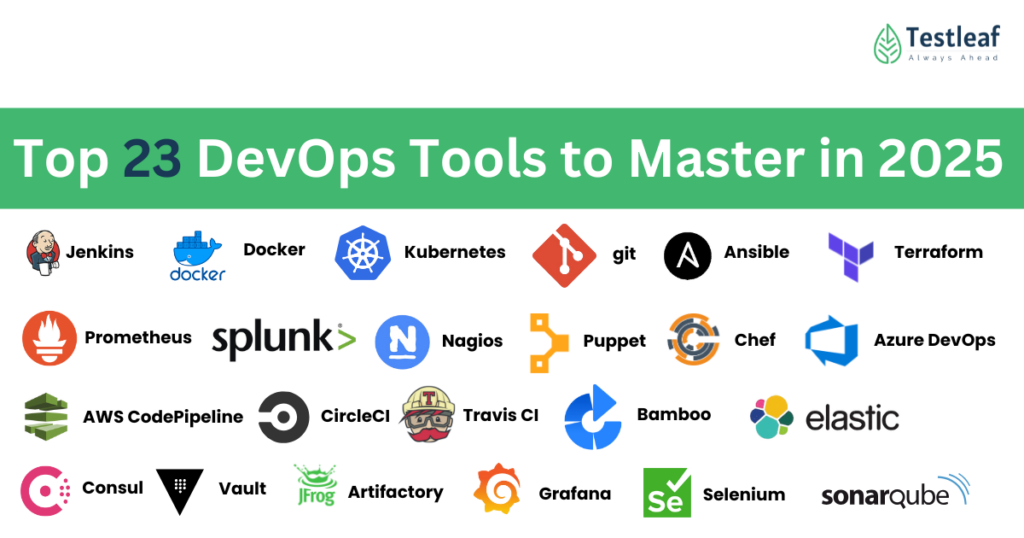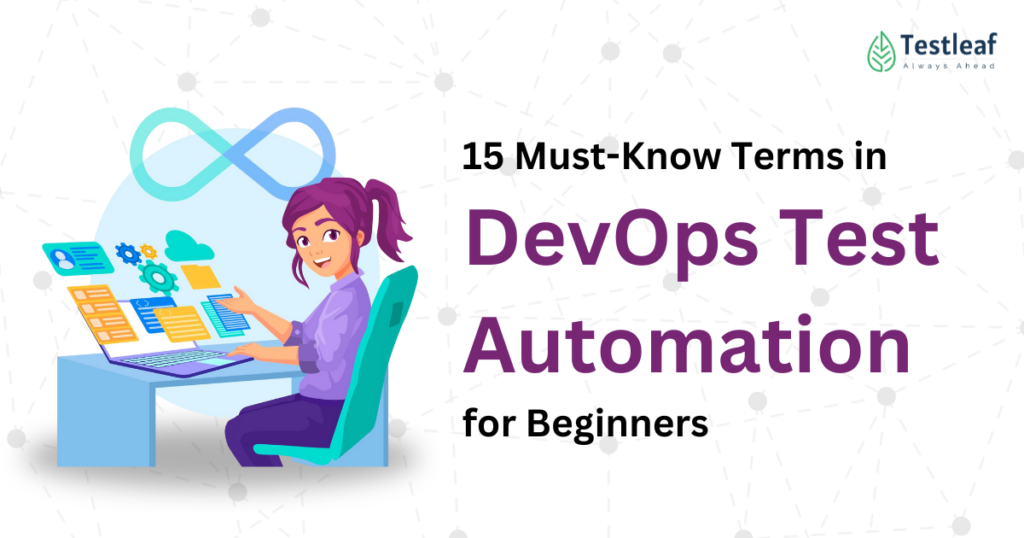In the fast-paced world of technology, DevOps has become a crucial part of how software is developed and delivered. As a DevOps Automation Test engineer, mastering the right tools is essential for success. In 2025, there are many tools that you should know to help streamline processes, improve collaboration, and enhance productivity. These tools will not only make your job easier but also help your team work better together.
In this blog, we will explore the top 23 DevOps tools that every engineer should master. From automation to monitoring, these tools cover all aspects of the DevOps lifecycle. Understanding and using these tools effectively will give you a significant advantage in your career.
As we dive into this list, remember that being skilled in these tools is not just about knowing how to use them; it’s about understanding how they fit into the bigger picture of software development and operations. So, let’s get started and discover the best DevOps tools to learn in 2025!
1. Jenkins (Like below I have gave external links do for all )
A continuous integration/continuous delivery (CI/CD) tool, Jenkins automates software builds and deployment. With its vast plugin ecosystem, Jenkins integrates with numerous tools, making it highly customizable for different workflows.
2. Docker
Docker remains a cornerstone in DevOps for containerizing applications. Its lightweight and portable containers simplify development, testing, and deployment across multiple environments.
3. Kubernetes
For container orchestration, Kubernetes is the go-to tool. It automates container deployment, scaling, and management, making it ideal for large-scale applications.
4. Git
Git, a version control system, ensures efficient collaboration among developers. Platforms like GitHub, GitLab, and Bitbucket enhance Git with additional DevOps features like CI/CD pipelines and code reviews.
5. Ansible
Ansible simplifies IT automation for configuration management and application deployment. Its YAML-based scripts are easy to write and maintain.
6. Terraform
Terraform enables infrastructure as code (IaC), allowing teams to provision and manage infrastructure across multiple cloud providers like AWS, Azure, and Google Cloud.
7. Prometheus
For monitoring and alerting, Prometheus is widely used. It provides powerful query capabilities and integrates seamlessly with visualization tools like Grafana.
8. Grafana
Grafana is a visualization tool that works with various data sources, including Prometheus. It provides customizable dashboards for monitoring system metrics.
9. Splunk
Splunk excels in log management and analysis, helping teams diagnose and resolve issues quickly. Its machine learning capabilities offer predictive insights into system performance.
10. Nagios
Nagios is a mature monitoring tool that provides comprehensive system health checks, making it easier to detect and fix potential issues in production.
11. Puppet
Puppet is a configuration management tool that automates repetitive tasks. Its declarative language makes it easy to define the desired state of your infrastructure.
12. Chef
Chef is another leading configuration management tool. It uses Ruby-based scripts called “recipes” to automate infrastructure management.
13. Azure DevOps
Azure DevOps offers end-to-end DevOps capabilities, from version control and CI/CD to monitoring and reporting. It’s particularly well-suited for teams leveraging Microsoft Azure.
14. AWS CodePipeline
AWS CodePipeline automates the software release process, integrating with various AWS services and third-party tools for seamless deployment.
15. CircleCI
CircleCI specializes in continuous integration and deployment. It supports multiple platforms and is known for its speed and ease of use.
16. Travis CI
Travis CI is a popular choice for open-source projects, providing straightforward CI/CD pipelines and integration with GitHub repositories.
17. Bamboo
Atlassian’s Bamboo is a CI/CD tool that integrates seamlessly with other Atlassian products like Jira and Bitbucket, making it ideal for teams already using the Atlassian suite.
18. ELK Stack (Elasticsearch, Logstash, Kibana)
The ELK Stack is a powerful trio for log aggregation, analysis, and visualization. It’s invaluable for diagnosing application issues and monitoring system health.
19. Consul
Consul provides service discovery and configuration for microservices architectures. It helps manage and secure service communication within distributed systems.
20. Vault
HashiCorp Vault secures sensitive data by managing secrets, passwords, and access control. It’s essential for maintaining compliance in modern DevOps workflows.
21. Artifactory
Artifactory is a universal artifact repository that supports all major package formats. It ensures reliable and efficient software builds and distribution.
22. Selenium
Selenium automates web application testing, ensuring that code changes don’t break existing functionality. It supports multiple programming languages and browsers.
23. SonarQube
SonarQube is a static code analysis tool that identifies code quality issues and security vulnerabilities, ensuring higher-quality software releases.
Key Benefits of Using DevOps Tools
- Improved Collaboration
DevOps tools bridge the gap between development and operations teams, fostering better communication and collaboration. - Faster Software Delivery
Automation tools like Jenkins, CircleCI, and Travis CI streamline the release pipeline, enabling faster delivery of software updates. - Enhanced Scalability
Tools like Kubernetes and Terraform enable organizations to scale infrastructure and applications effortlessly. - Proactive Monitoring
Monitoring tools like Prometheus and Splunk allow teams to detect issues before they impact end-users. - Increased Security
Tools like Vault and SonarQube ensure that sensitive data and code vulnerabilities are managed effectively.
How to Choose the Right DevOps Tools?
- Define Your Requirements
Understand your team’s specific needs, such as CI/CD, infrastructure management, or monitoring. - Evaluate Compatibility
Ensure the tool integrates seamlessly with your existing tech stack. - Assess Scalability
Choose tools that can grow with your organization. - Consider Ease of Use
Opt for tools with intuitive interfaces and strong community support. - Review Costs
Balance functionality with budget constraints, considering both upfront costs and long-term value.
Emerging Trends in DevOps Tools for 2025
- AI and Machine Learning Integration
Tools are incorporating AI/ML to optimize workflows, predict failures, and enhance decision-making. - Cloud-Native Tools
The shift toward microservices and serverless architectures is driving demand for cloud-native DevOps tools. - Greater Focus on Security
DevSecOps tools like Vault and SonarQube are becoming integral to secure DevOps pipelines. - No-Code/Low-Code Solutions
Simplified tools for non-technical users are gaining traction, democratizing DevOps capabilities. - Hybrid and Multi-Cloud Support
Tools like Terraform and Kubernetes are enabling seamless operations across hybrid and multi-cloud environments.
Upshots
There you have it – the top 23 DevOps tools that you should master in 2025. As a DevOps Test Automation Engineer, it’s essential to stay up-to-date with the latest tools and technologies to deliver high-quality software quickly and efficiently. By mastering these tools, you’ll be able to streamline your test automation workflows, improve collaboration with your development team, and reduce errors.
Ready to take your DevOps test automation skills to the next level?
Ready to take your DevOps skills to the next level? Learn more about DevOps Test Automation online with Testleaf’s DevOps Test Automation Course
We Also Provide Training In:
- Advanced Selenium Training
- Playwright Training
- Gen AI Training
- AWS Training
- REST API Training
- Full Stack Training
- Appium Training
- DevOps Training
- JMeter Performance Training
Author’s Bio:

As CEO of TestLeaf, I’m dedicated to transforming software testing by empowering individuals with real-world skills and advanced technology. With 24+ years in software engineering, I lead our mission to shape local talent into global software professionals. Join us in redefining the future of test engineering and making a lasting impact in the tech world.
Babu Manickam
CEO – Testleaf





